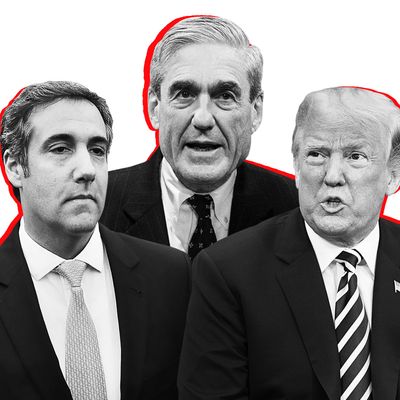
President Trump has made it perfectly plain that he views any scrutiny of his finances as a mortal threat. Trump “was especially disturbed after learning [Robert] Mueller would be able to access several years of his tax returns,” the Washington Post reported last summer, and his allies have homed in on the theme that Trump’s finances are the room in the crime scene that Mueller should not go into because there is nothing to see there. “Mueller basically backdoored his way into every single Trump business deal,” complains Sean Hannity. “Mueller has the duty to investigate collusion, not Trump’s business deals. He will lose legitimacy if he strays from his mission,” insists former Bush press secretary Ari Fleischer.
This weekend, the New York Times and the Washington Post published detailed investigations into the financial history Mueller is investigating. While carefully couching the findings within the bounds of the facts they were able to prove based on publicly available data, these reports made it perfectly clear that Trump’s business empire is not only dirty, but dirty in a way that leads directly into the national-security threat that produced Mueller’s investigation in the first place.
The Post account zeroes in on a peculiar turn in the Trump Organization’s financial structure. Trump has styled himself “the king of debt” and throughout his career touted the virtues of borrowing as the foundation of his business philosophy. (Relying on debt is not uncommon among real-estate developers.) But the Post reveals that Trump’s investing strategy has taken a sharp U-turn in the last decade, when his organization suddenly began buying properties with straight cash.
Trump’s proffered explanation is that the cash binge simply reflects his extraordinary success and innate business genius. “He had incredible cash flow and built incredible wealth,” Eric Trump explained. “He didn’t need to think about borrowing for every transaction. We invested in ourselves.” Yet the Post’s reporting makes this account appear dubious. In 2014, Trump spent $80 million to buy a pair of golf courses in Scotland and Ireland, and had to spend more than twice as much to keep them running.
A phrase that does not appear in the Post’s article, because the reporters cannot prove it, is “money laundering.” But money laundering is the suspicion hovering over all these curious purchases, and the reason the Post is devoting so many investigative resources to the subject in the first place. “This is all about money laundering,” Steve Bannon told Michael Wolff. “[Mueller’s] path to fucking Trump goes right through Paul Manafort, Don Jr. and Jared Kushner … It goes through Deutsche Bank and all the Kushner shit.”
Money laundering would be criminal activity. If you are involved in criminal activity, you are subject to blackmail. And if the criminals who can blackmail you have connections to a foreign government — say, Russia — then that government has blackmail leverage. Ten years ago, Donald Trump Jr. casually said, “Russians make up a pretty disproportionate cross-section of a lot of our assets.” And as recently as 2014, Eric Trump told a reporter, “We don’t rely on American banks. We have all the funding we need out of Russia,” which is quite different than his current explanation that the Trump Organization does not require outside funding at all.
The secret sauce of Trump’s real-estate business in its early stages was his ability to manipulate the media and willingness to borrow massive sums and not pay them back. When he exhausted his ability to stiff his creditors, the new secret sauce became a willingness to take money from shady overseas sources, especially (but not exclusively) Russian oligarchs looking either to park their cash overseas, or to gain some measure of influence. Whether Russia was investing in Trump for the purpose of gaining some hidden leverage over him is not incidental to the Mueller investigation but its very heart.
Likewise, a casual reader of the Times report on Michael Cohen’s business history may have missed the significance concealed beneath its carefully measured language. The upshot is that Cohen is not the schlubby, unethical lawyer Ben Stiller portrayed him as on Saturday Night Live. Cohen’s father uncle, the Times reveals, worked closely with La Cosa Nostra and gained the organization’s trust. Cohen’s first employer was a criminal, his father-in-law was a criminal with ties to the Russian Mafia, and Cohen maintained extensive criminal associations throughout his public life. Sometimes people involved in mostly legitimate business have gangster friends, but if you’re surrounded at all stages by gangsters — including operating your business out of a criminal headquarters, as Cohen did — then your real profession is “crook.” The Times can’t prove it, nor can I, but this is the takeaway.
Cohen, of course, was also involved in dealings with Russian government sources. The Steele dossier alleged he met with Russian intelligence in Prague after the election, and Cohen denied having done so, though Mueller has reportedly questioned his alibi. But even beyond whatever direct dealings Cohen had with Russian intelligence, his legal and financial vulnerability create a serious national security risk. If the American public doesn’t know the full extent of Cohen’s alleged misdeeds, we can be fairly confident the Russian Mafia does, and nearly as confident that its information has made its way to the Kremlin.
Trump’s business empire provided the entire basis for his claim to be qualified to be president. It was the proof of his genius, that he alone possessed the deal-making skills and knowledge of the political system to fix it. He managed to conceal the nature of that business empire by withholding his tax returns, and media scrutiny of his business dealings has still only scratched the surface. Those secrets carry alongside them national-security risks of unknown scale. The argument now put forward by the president and his defenders is that the FBI has no business exposing these secrets, which ought instead to remain locked in the vaults of Trump’s shadowy counterparties.






























